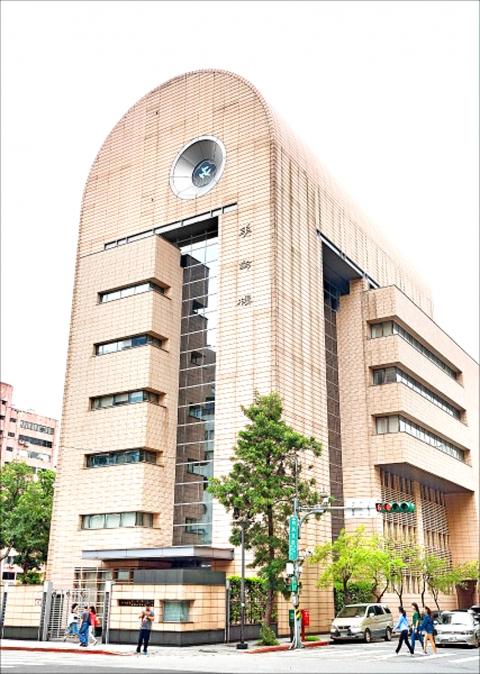The Chinese Nationalist Party (KMT) remained the nation’s richest political party last year with NT$18.1 billion (US$595.06 million) in reported assets, despite posting losses totaling NT$800 million since 2015, its financial statements to the Ministry of the Interior show.
Last year, the KMT posted an income of NT$1.48 billion and expenditures of NT$2.07 billion, its financial disclosures show.
Since 2006, political parties and organizations have been obliged to disclose their financial statements to the ministry in accordance with the Guidelines for the Financial Declarations of Political Parties and Political Organizations.

Photo: Cheng Hung-ta, Taipei Times
The financial declarations are considered public information and the reports are to be made available later this month on the ministry’s Web site.
The KMT’s assets continue to dwarf those of the nation’s other major parties, including the Democratic Progressive Party, which had a reported worth of NT$700 million last year, recording NT$800 million in income and NT$510 million in expenditures, its statements show.
The New Power Party (NPP), founded in early 2015, last year had a net worth of more than NT$20 million, with an income of NT$46 million and expenditures of NT$34 million, its statements show.
The KMT declared its holdings under the party-owned Central Investment Co Ltd (中央投資公司) and Hsinyutai Co Ltd (欣裕台), which were last year declared illicit assets by the Ill-gotten Party Assets Settlement Committee.
Central Investments and Hsinyutai last year had combined assets of NT$15.2 billion, NT$400 million less than 2015’s figures, the statements show.
The KMT also declared NT$100 million in real estate and land, NT$3 million less than the previous year.
In addition, the KMT registered NT$93 million in “current liabilities,” or debts it had to pay within 12 months, the statements show.
The liabilities were comprised of NT$90 million and NT$3 million in private loans that the KMT had borrowed from former chairwoman Hung Hsiu-chu (洪秀柱) and Vice Chairman Jason Hu (胡志強), which had been paid in full by auditing time.
The KMT’s estimated NT$2.07 billion in expenditures included more than NT$1 billion in personnel costs, NT$800 million in operational expenses and NT$162.36 million in outbound political donations and others.
The party’s NT$1.48 billion in revenue was mainly from income gained in trust funds which made up an estimated NT$956 million, or 64.65 percent of the total, it said.
The KMT also received NT$278 million in political subsidies, NT$122 million in political contributions, NT$116 million in membership dues and other sources, the statements showed.
Meanwhile, the financial statements of the National Women’s League indicate that the organization last year had assets worth NT$38.4 billion, including 13 parcels of real estate and NT$240 million in returns on investments.
The league’s financial disclosure forms to the government showed that its actual holdings in May last year exceeded the sum it claimed in February by NT$300 million.
At the time, the league told local media outlets that it had NT$38.1 billion in net worth, NT$2.8 billion of which was to be donated
Its financial statements showed that the league increased its holdings by NT$1.7 billion from May last year through May this year.

MAKING WAVES: China’s maritime militia could become a nontraditional threat in war, clogging up shipping lanes to prevent US or Japanese intervention, a report said About 1,900 Chinese ships flying flags of convenience and fishing vessels that participated in China’s military exercises around Taiwan last month and in January last year have been listed for monitoring, Coast Guard Administration (CGA) Deputy Director-General Hsieh Ching-chin (謝慶欽) said yesterday. Following amendments to the Commercial Port Act (商港法) and the Law of Ships (船舶法) last month, the CGA can designate possible berthing areas or deny ports of call for vessels suspected of loitering around areas where undersea cables can be accessed, Oceans Affairs Council Minister Kuan Bi-ling (管碧玲) said. The list of suspected ships, originally 300, had risen to about

DAREDEVIL: Honnold said it had always been a dream of his to climb Taipei 101, while a Netflix producer said the skyscraper was ‘a real icon of this country’ US climber Alex Honnold yesterday took on Taiwan’s tallest building, becoming the first person to scale Taipei 101 without a rope, harness or safety net. Hundreds of spectators gathered at the base of the 101-story skyscraper to watch Honnold, 40, embark on his daredevil feat, which was also broadcast live on Netflix. Dressed in a red T-shirt and yellow custom-made climbing shoes, Honnold swiftly moved up the southeast face of the glass and steel building. At one point, he stepped onto a platform midway up to wave down at fans and onlookers who were taking photos. People watching from inside

Japan’s strategic alliance with the US would collapse if Tokyo were to turn away from a conflict in Taiwan, Japanese Prime Minister Sanae Takaichi said yesterday, but distanced herself from previous comments that suggested a possible military response in such an event. Takaichi expressed her latest views on a nationally broadcast TV program late on Monday, where an opposition party leader criticized her for igniting tensions with China with the earlier remarks. Ties between Japan and China have sunk to the worst level in years after Takaichi said in November that a hypothetical Chinese attack on Taiwan could bring about a Japanese

STREAMLINED: The dedicated funding would allow the US to transfer equipment to Taiwan when needed and order upgraded replacements for stockpiles, a source said The US House of Representatives on Thursday passed a defense appropriations bill totaling US$838.7 billion, of which US$1 billion is to be allocated to reinforcing security cooperation with Taiwan and US$150 million to replace defense articles provided to the nation. These are part of the Consolidated Appropriation Act, which the US House yesterday passed with 341 votes in favor and 88 against. The act must be passed by the US Senate before Friday next week to avoid another government shutdown. The US House Committee on Appropriations on Monday unveiled the act, saying that it allocates US$1 billion for the Taiwan Security Cooperation Initiative